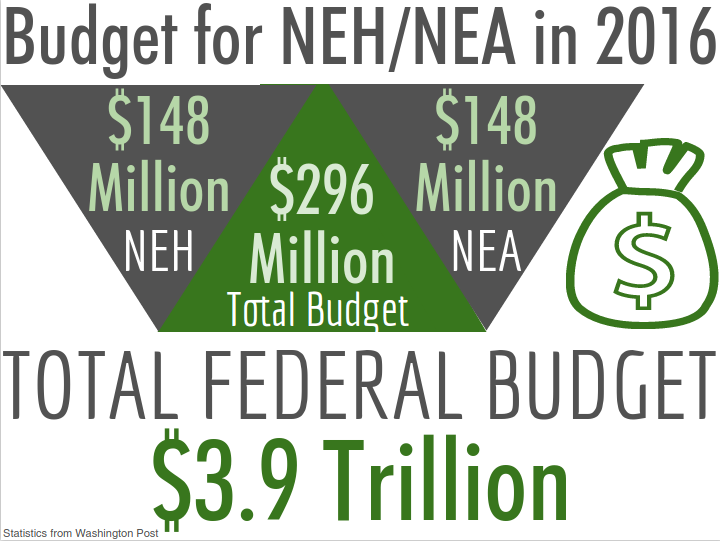Funding for the arts, humanities a necessity, not a luxury
March 1, 2017
The White House Budget Office has proposed eliminating a number of domestic arts and humanities programs, including the National Endowment for the Humanities (NEH) and the National Endowment for the Arts (NEA). These independent federal agencies promote the humanities and the arts by awarding grants to museums, libraries, universities, scholars, public television networks and radio stations. Their funding goes to arts and humanities organizations in every state and territory.
Because the work of these agencies furthers the education of all Americans, it is essential that both endowments continue to receive federal funding.
Educating teachers is a vital method of passing knowledge onto generations of students: the NEH offers all-expenses-paid seminars for high school teachers and college professors to expand and enhance their knowledge of their subject each summer. English resource teacher Linda Leslie attended one such seminar on authors Henry David Thoreau, Ralph Waldo Emerson and Margaret Fuller at Oregon State University at Corvallis.
The five-week seminar afforded her a better understanding of the historical context surrounding these transcendentalist writers, Leslie said, material she has incorporated into her lessons ever since. It also inspired her to pursue graduate school, a life changing decision.
Both endowments also directly impact the classroom by funding experiences—including projects, residencies, and multimedia materials—that enrich existing lessons and keep students engaged.
Humanities projects also offer opportunities for civic engagement and community connectedness. They challenge individuals to relate to new points of view, a vital skill in a democracy.
— Maryland Humanities rep Jessica WichmannFor example, the Maryland State Arts Council uses NEA funds to run programs that place professional artists—including performing, visual, and literary artists—into school settings to work on short-term projects or mentor students through long-term residencies, the executive director of the Maryland State Arts Council, Theresa Colvin, said. In 2016, these programs reached about 500 Maryland schools.
The NEH also funds the efforts of historians and documentarians to preserve and publish primary sources as exhibits and documentaries. Seeing original letters, hearing stories and songs and viewing footage allows students to realize the reality of history and how it impacted people, said history teacher Gregory Herbert.
In this regard, the work of the agency is invaluable, said Herbert, who shows one such documentary—Ken Burns’ The Civil War—to his AP U.S. history classes.
The agency provided funding for the award-winning film and distributed 4,000 free copies to schools and libraries nationwide, according to the agency. This award-winning documentary serves as vital educational tool by focusing on individual soldiers’ stories and helping students understand the war’s gravity, an aspect that statistics can’t encapsulate.
The Trump team has claimed that dedicating federal funds to cultural projects is wasteful and that these sectors must be cut in an effort to reign in the federal budget. But the combined budgets of the two agencies—$296 million—is just .0007 percent of the massive $3.9 trillion budget.
Besides, the work of the two endowments shapes national character and strengthens our democracy. There is no better demonstration of democracy and freedom of expression than a diverse arts scene, Colvin said.
Humanities projects also offer opportunities for civic engagement and community connectedness, the communications officer of Maryland Humanities, Jessica Wichmann said. They challenge individuals to relate to new points of view, a vital skill in a democracy, she said.
The expense of these endowments is small, but the results are momentous for the education of the American people and by extension, the preservation of American culture and democracy.








sunny • Dec 25, 2020 at 6:38 am
Great Writing! This blog is really very informative. Thanks for sharing it with us. Vape Dubai